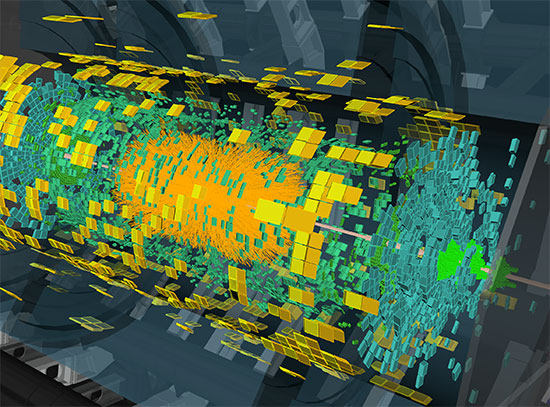Contact: Peter Genzer, (631) 344-3174 | Written by Kendra Snyder
LHC Experiments Eliminate More Higgs Hiding Spots
August 22, 2011
BATAVIA, IL and UPTON, NY — Two experimental collaborations at the Large Hadron Collider, located at CERN laboratory near Geneva, Switzerland, announced today that they have significantly narrowed the mass region in which the Higgs boson could be hiding.
The ATLAS and CMS experiments excluded with 95 percent certainty the existence of a Higgs over most of the mass region from 145 to 466 GeV. They announced the new results at the biennial Lepton-Photon conference, held this year in Mumbai, India.
“Each time we add new data to our analyses, we close in more on where the Higgs might be hiding,” said Darin Acosta, a University of Florida professor and deputy physics coordinator for the CMS experiment.
More than 1,700 scientists, engineers and graduate students from the United States collaborate on the experiments at the LHC, most of them on the CMS and ATLAS experiments, through funding by the Department of Energy Office of Science and the National Science Foundation. Brookhaven National Laboratory serves as the U.S. base for participation in the ATLAS experiment, and Fermi National Accelerator Laboratory serves as the U.S. base for participation in the CMS experiment.
The Higgs particle is the last not-yet-observed piece of the theoretical framework known as the Standard Model of particles and forces. According to the Standard Model, the Higgs boson explains why some particles have mass and others do not.
“The more data the experiments collect, the more scientists can say with greater statistical certainty,” said Konstantinos Nikolopoulos, a physicist at Brookhaven National Laboratory on the ATLAS experiment. “The LHC has been providing that data at an impressive rate. The machine has been functioning beyond expectations.”
Scientists on ATLAS and CMS both announced seeing small, possible hints of the Higgs boson at the European Physical Society meeting in July. Those hints have become less pronounced as scientists have increased the amount of data in their analysis.
“These are exciting times for particle physics,” said CERN’s research director, Sergio Bertolucci. “Discoveries are almost assured within the next twelve months. If the Higgs exists, the LHC experiments will soon find it. If it does not, its absence will point the way to new physics.”
The experiments are on track to at least double the amount of data they have collected by the end of the year.
Notes for editors:
Information about the US participation in the LHC is available at http://www.uslhc.us. Follow US LHC on Twitter at twitter.com/uslhc.
Brookhaven National Laboratory is operated and managed for DOE's Office of Science by Brookhaven Science Associates and Battelle. Visit Brookhaven Lab's electronic newsroom for links, news archives, graphics, and more: http://www.bnl.gov/newsroom.
Fermilab is a U.S. Department of Energy Office of Science national laboratory, operated under contract by the Fermi Research Alliance, LLC. Visit Fermilab’s website at http://www.fnal.gov.
The DOE Office of Science is the single largest supporter of basic research in the physical sciences in the United States, and is working to address some of the most pressing challenges of our time. For more information, please visit http://science.energy.gov.
The National Science Foundation focuses its LHC support on funding the activiites of U.S. university scientists and students on the ATLAS, CMS and LHCb detectors, as well as promoting the development of advanced computing innovations essential to address the data challenges posed by the LHC. For more information, please visit http://www.nsf.gov/.
CERN, the European Organization for Nuclear Research, is the world's leading laboratory for particle physics. It has its headquarters in Geneva. At present, its Member States are Austria, Belgium, Bulgaria, the Czech Republic, Denmark, Finland, France, Germany, Greece, Hungary, Italy, the Netherlands, Norway, Poland, Portugal, Slovakia, Spain, Sweden, Switzerland and the United Kingdom. Romania is a candidate for accession. India, Israel, Japan, the Russian Federation, the United States of America, Turkey, the European Commission and UNESCO have Observer status.
Media contacts:
Brookhaven National Laboratory — Kendra Snyder, ksnyder@bnl.gov, 631-344-8191
Fermi National Accelerator Laboratory — Elizabeth Clements, lizzie@fnal.gov, 630-840-2326
2011-11320 | INT/EXT | Newsroom







